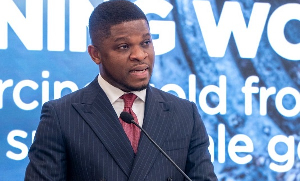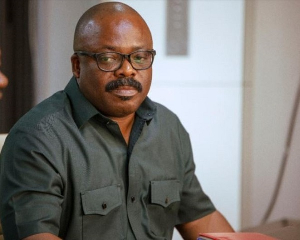What is a sequestered Francis Annan watching during a global pandemic? “A lot of older cinema,” he tells me on a recent Friday via video correspondence.
The man who recently released his highly suspenseful, already critically received debut feature Escape From Pretoria, is returning to masters as Robert Bresson and Christian Petzold, from whom he is discovering afresh the “elemental attributes” of film.
“On one hand, you want to be consuming a lot of different types of things,” he says, a quick pace and British accent attending his speech. And yet, seeing as that modern art sits within “a larger remit,” one often has to hark back to vintage cinema for the building blocks of the art form, he reckons.
Annan’s career as a filmmaker began at the BBC some 16 years ago where he acquired experience making award-winning short films and directing primetime BBC One drama for British Television. He also has several feature projects in development as director and writer/director. If his name rings a bell to the Ghanaian ear, it is because he’s the grandson of Justice Daniel Francis Annan, a renowned statesman and former Speaker of the Parliament.
Escape From Pretoria, the political thriller Annan co-wrote and directed, is based on a 1987 memoir by Tim Jenkin, in which Jenkin relates his 1979 escape from Pretoria Central Prison, along with fellow political activists Stephen Lee and Alex Moumbaris. It follows Jenkin (played by Daniel Radcliffe) and Lee (Daniel Webber); young, white South Africans branded ‘terrorists’ for their association with Nelson Mandela’s banned ANC.
Because of the themes it addresses, Annan’s film arrives at a particularly momentous time in history during which, sparked by the death of George Floyd, the world is witnessing renewed protests against race-based discrimination. While he welcomes the notion that his film is an important contribution to current discourse on institutionalised racism and an unjust society, Annan is disappointed that history keeps repeating itself.
He admits that the film “could have done more.” There’s some context to this, he explains: Escape From Pretoria wasn’t originally slated to be filmed in Australia (shooting was supposed to have happened in South Africa). Due to budget constraints, however, producers had to look elsewhere, in Adelaide. Again, a lot of the “bigger scenes” had to be trimmed to accommodate the new budget. Annan also concedes that there could have been more politics in the film itself. And yet it works, he says, insofar as it conveys the central message of political convictions translating to action.
“Even though they [Jenkin and Lee] were white and middle class and young men who should have gone to do something else, they decided ‘no, no! We do think apartheid is wrong, and we realise that of we just leave the country or do something else, it’s not going to be enough. We need to stay here and fight those guys.
“Therefore, talking is great, but at the end of the day, action is what matters. That’s what the film is about, and that’s why the film works—because they [the film’s lead characters] do something that gets them put to prison, and they have a mind-set which says ‘breaking out is the only violent response because we are prisoners of war.’ And that’s amazing. They didn’t intellectualize it; they said ‘action!’”
Pretoria Central Prison was well known as the “white man’s Robben Island” and housed white political prisoners who would have been on Robben Island but were sent to Pretoria because even within the prison system, apartheid applied. This meant that in telling Jenkin’s story, staying clear of inflexions and fictitious characters as much as possible, Annan had to fall on a predominantly white cast to treat a predominantly black tale. But he justifies the colour of his actors, arguing that the apartheid story presents varied subplots, Jenkins representing just a single tributary.
“This is the book. We’re making a film about the book. The book goes there so we go there, then that’s what the film is going to look like. If I start trying to shoehorn black African characters in, then we’re doing something else. I wanted to be quite clean with the book, and stick with that.”
Indeed, notes Annan, it’s accurate to say that the campaign to end apartheid was contributed to by a “tapestry” of people from plural backgrounds. Escape From Pretoria is just one aspect of a multifaceted story.
For many Ghanaian and West African citizens, though the concept of discrimination is not unfamiliar, the sort that is tied to a person’s race is not common. His tribe, yes, but not the complexion of his skin. What then drew Annan to the story? What is the film’s specific intention for the country from where its director gets his surname?
As a child, Annan remembers hearing stories from his grandfather and mum. The older Francis Annan travelled a lot on behalf of Ghana and would return with fascinating stories from all over the world. Even if Ghana wasn’t directly affected by apartheid, “there was this kind of West African voyeurism with what was going on in South Africa,” little Annan observed, a characteristic he likens to how Central Asians looked at Vietnam or Cambodia or how Europeans looked at Eat and West Berlin. Or Czechoslovakia breaking up or the Soviet Union breaking up. “It’s still part of the same continent, but feels so alien.”
“It was kind of interpretation that I felt by West Africans with regards to South Africa, and so I always remember that..”
It was even more fascinating for Annan to discover that not only was the story of apartheid more complex, “but [with] the whites who may be seen as majority aggressors, it wasn’t that clean-cut either.”
“There were many whites of conviction who would stop paying tax or leave the country saying ‘I don’t want to be part of this rubbish anymore,’ or there was a party called the Progressive Party which some people have criticised for being ineffective— but they set it up to be some kind of check and balance against apartheid. Or, like the two characters in this film, there were many French, white South African, or English people who came to South Africa to join forces with the ANC, whose base was actually in London, and so it was a much more international anti-apartheid affair than I knew. I just thought it was whites on one side and Africans on the other.
It was not: There was the Black Sach Movement, a non-violent liberal group comprising African, white and Asian women who fought against apartheid in their own way, some going to prison, others losing their jobs among other things. There were Asians who registered their displeasure by employing methods as refusing to pay tax and holding rallies, recounts Annan.
Upon reading Jenkin’s story, Annan felt a shift in his head. “That’s interesting,” he thought. “And I’m hoping that something of that kind of shift can happen in a lot of West Africans, Ghanaians and just Africans in general.”
On what film — the storytelling medium he specialises in — can achieve that a book can’t and vice versa, Annan says: “A film has visuals. With a single look, a close-up shot, it can say ten pages about how a man was jealous and filled with rage because another man got a job or promotion that he didn’t get.”
That’s not all: There’s music to evoke emotion; there’s transition of time (“a cut can move from one continent to another or span a hundred years in a jump cut.”) in that way, to his mind, film is “unique and has potentially more tricks at its disposal, but the necessity for it to be pointing to one thing - I think — is freeing in a novel.”
I ask how he went about distilling the different emotions present in the story to achieve such a pulsating atmosphere in the film. “Things like fear, trepidation and courage are often expressed in action rather than talking about it,” he replies.
“You can [talk about them], but when a man is in the trenches, clutching his gun, and trembling with fear, and the sergeant says ‘ok, everybody up and over!’, many don’t, but the ones who say, ‘look, I’m scared, but I’m going to do it anyway, that’s courage.
“And so, if I could find actions that illustrated that even though they [characters in the film] don’t have a full plan; even though there’s division amongst the ranks as to what the best method of attack is: stay in prison and endure an unjust sentence or escape — even though there are those discrepancies, nonetheless, they act[…] To act and to rebel against the unjust regime is, in itself, winning; you’re winning if you don’t sit there and accept their unjust sentence. And so I try to make it as tense as possible because I want you to feel that you’re on that corridor with them, and the tension illustrates what’s at stake, and what’s at stake shows you how brave they were to do it anyway.”
As a filmmaker, does Annan see an end in sight regarding racial unrest, or are we, twenty yeas on, to expect new films to tackle issues thus?
Annan is optimistic, but cautiously so. Things will improve, but more films will be made twenty years on.
“When slavery happened, nobody realised that it was a PR campaign. It was a marketing campaign for the African, their place in the world, their position, their appearance, and what they mean in the world.”
Hundreds of years later, “the mental narrative of global capitalisation,” has yet to be addressed, he notes. “Blacks served a role in the creation, advancement, and prosperity of America which European-Americans are not willing to accord the African-American who picked the cotton, picked the corn, and cut the sugarcane and built the antebellum houses and so on.”
The remedy: retribution.
“There’s an element of the American psyche which is refusing to look back at that time and say not only are we sorry, but America isn’t America without that labour.”
He continues: “that racist base in America and other parts of the world is justified and emboldened by being able to replace the real narrative with another version of events, which is what is perpetuating the racism.”
Maybe in several generations; as the truth expands, real chance will happen, he feels. Otherwise, the vicious cycle will continue, new films and hashtags emerging with a new wave of protests.
Entertainment of Saturday, 22 August 2020
Source: enewsgh.com













